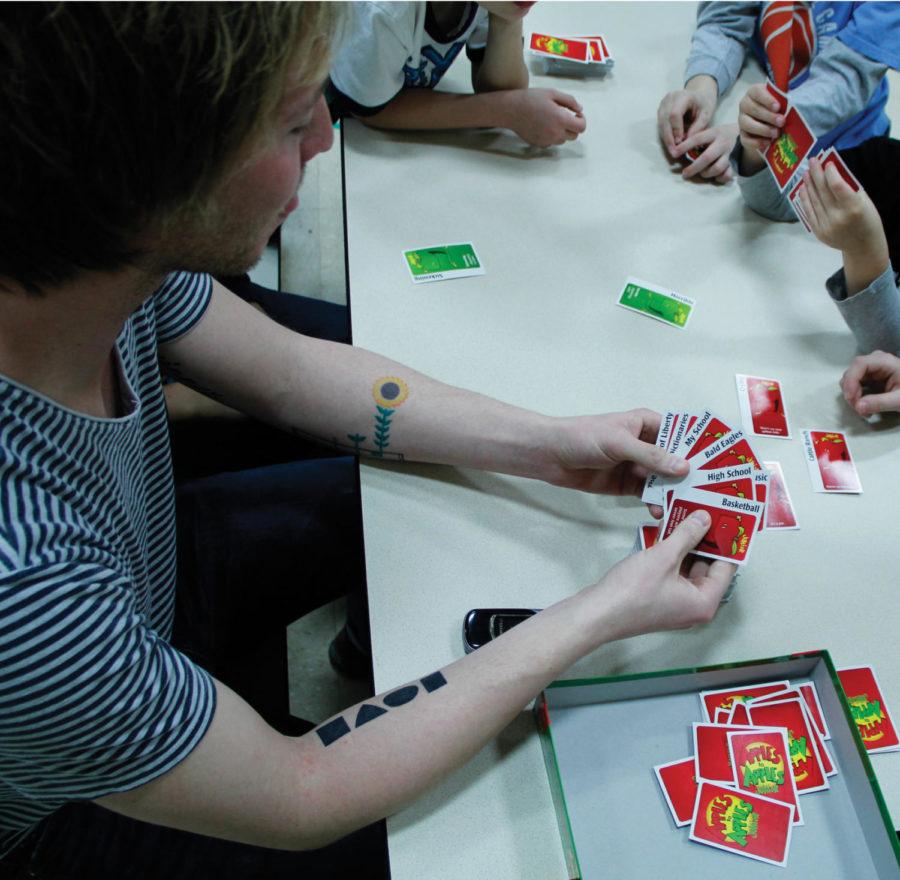The changing tattoo taboo
Photo:Emily Harmon/Iowa State Daily
Peter Holmgren, ISU graduate, works with children at Edwards Elementary School. Holmgren has visible tattoos on both forearms and a bicep but can let the tattoos show at work.
February 16, 2012
During the early 1900s, women who smoked cigarettes in public were heavily frowned upon. It was considered dirty and caused great dispute, but eventually the taboo faded. In the past, visible tattoos were frowned upon in the workplace, but today, many argue that the issue is changing as well.
Of all professions, it is hard to imagine a teacher with multiple visible tattoos, but times have changed and more people have become more relaxed about the visible presence of tattoos in the workplace.
Pete Holmgren currently has three tattoos and is planning a three-quarter sleeve, “eventually,” he said. He has one tattoo on each of his forearms and one on his left bicep. Currently, Holmgren is a child care provider at Ames Community Preschool Center.
“Right now, as a child care provider, I don’t think they are looked down upon. I’ve only had one or two parents mention something to my boss about tattoo policies, he said. “I feel as long as they aren’t offensive [or] inappropriate, they aren’t a problem.”
The decision to get inked wasn’t one he took lightly.
“Future employment was always on my mind. I was thinking of a full sleeve instead of a three-fourths sleeve, but decided against it,” he said. “That way, I can still wear button-ups and do one or two sleeve rolls and still have them not show.”
For some jobs, tattoos might actually positively add to your image. Bob Parr, owner and operator of Jaded Angel Tattoo and Piercing on Welch Avenue, argues that tattoos may come in handy depending on what you’re doing.
“Some jobs it’s beneficial [to have tattoos], like a bouncer at a bar,” Parr said. “It makes them more intimidating.”
Most of Jaded Angel’s clients are college students and young adults. And like most tattoo and piercing businesses, they will not serve customers who are or appear to be intoxicated.
“If we can tell someone is drunk or has been drinking, we won’t tattoo them,” Parr said.
Many agree that this issue lies in the “gray area” where most will say that tattoos are appropriate depending on what you are doing and who you are working with.
Patti Easker, an employee of Stomping Grounds, said that tattoos are more accepted in certain environments such as coffee shops and restaurants, especially if they can be covered easily.
“Generally, tattoos are acceptable in the workplace as long as they are not vulgar,” Easker said.
ISU Dining has traditionally had a policy against visible ink, but may soon be more accepting of tattooed students looking for employment.
Although the current policy states, “‘All tattoos must be covered appropriately,’ the possible removal of this policy is currently being discussed and it is most likely that this will be removed in the next draft of our policy handbook,” wrote Brittney Rutherford, marketing coordinator for ISU Dining.
“I think it depends on the workplace,” wrote Taren Reker Crow, program coordinator for Liberal Arts and Science Career Services. “In professions that are more traditional or professional, they can be deemed inappropriate. However, in more relaxed settings or in occupations that thrive on creativity, they can be well received.”
Reker Crow advised students to keep in mind that tattoos may affect future job opportunities.
“I think students need to be conscientious of the expectations of their field and know that there might be people who will pass judgment based on visible tattoos,” she wrote.
Ultimately, it is up to the employer you work for and the nature of your tattoos.
“Keeping a good attitude and strong work ethic, being trustworthy and dedicated employee outweighs the presence of tattoos,” Holmgren said.







